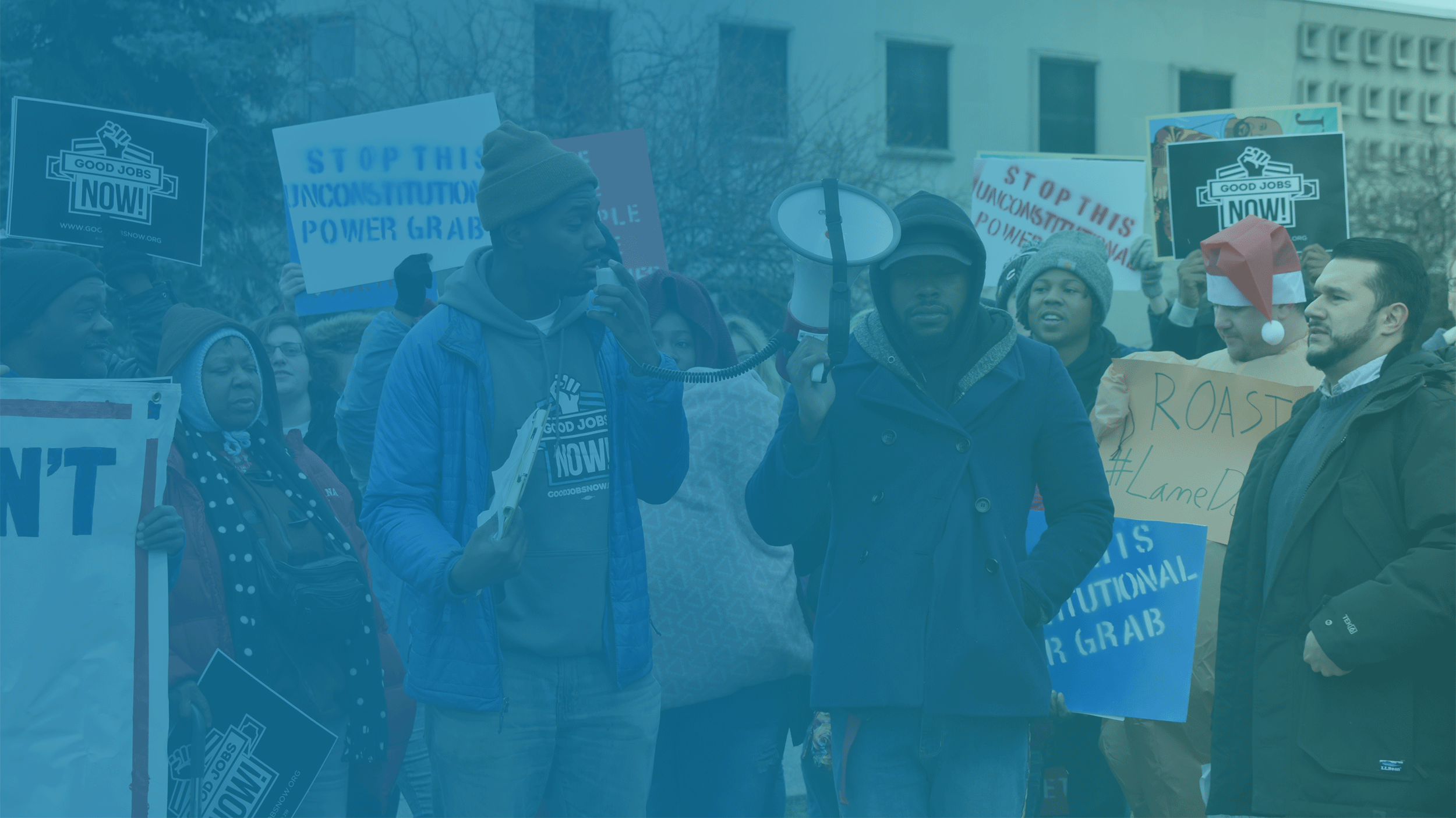Louisianans Come Together to Call for ARP-Funded Equitable Recovery Plan
Chloe2022-09-07T13:53:08-04:00The Unlikely Coalition that Won $20 Million of ARP Funds for Affordable Housing in Maine
Chloe2022-07-25T19:58:26-04:00Project Overview
For weeks, labor, climate, and housing organizers in Maine had been collaborating on a bill for a housing bond. When the Biden administration dropped one of the largest buckets of money into the state budget in decades through fiscal recovery funds as part of the American Rescue Plan, these advocates saw a new opportunity to fund their priorities. They set their sights on securing $100 million in ARP funds for more affordable housing with higher labor and energy standards.
There were a lot of priorities to juggle, Cate Blackford of Maine People’s Alliance said. The coalition had a hardline: “We would not compromise on labor or efficiency standards or on ensuring the new housing would serve those who needed it most,” she said.
It was especially difficult to navigate how to strengthen work standards for the new housing projects. “Because finance packages are so complex, adding in any additional requirements on the projects made it impractical for some of the contractors,” Blackford explained. And builders, like nearly every sector, were affected by Covid-related worker shortages.
Community-Centered Process
Each member of the coalition used their unique powers to move legislators. Labor organizers leaned in heavily on Senate leadership. And once the green builders got into the mix and said they would take on the projects with higher labor and efficiency standards, their coalition grew even more powerful. While labor threw down their political power, the green builders made phone calls to their networks, and affordable housing advocates organized lobby days and ran social media campaigns to engage the public.
Organizing Wins
In the end, they secured $20 million in ARPA funds for affordable housing that were — for the first time ever — qualified with higher energy efficiency and labor standards. But they made a mistake, Blackford said. Because many Senate leaders were hearing so often from the labor end of the coalition, they knew they had to keep the higher work standards in their legislation. But when leadership moved the proposal from the original legislation into the budget, the energy efficiency standards were inadvertently not included.
“While this was disheartening when it happened, the end result was actually much more powerful,” Blackford said. The coalition continued advocating through the rulemaking process and ultimately passed an amended version of the original bill to maximize the energy efficiency standards for all new affordable housing.
Equity Goals
While a huge and necessary investment, the ARP funds were a one-time infusion of cash, so the next step for Maine People’s Alliance is a push for more sustainable money. Namely, moving more of the state budget from general funding into housing to the tune of $20 million a year and paying for housing with funds from the estate tax. They’re also working with groups like the Maine Immigrant Housing Coalition to make it easier for affordable housing projects to get permits and establishing a new state voucher program that is more flexible and can serve folks regardless of their immigration status.
And Blackford sees a definite future for this coalition of labor, environmental, and housing groups in Maine, even if it wasn’t an easy road. “We had to build a lot of trust and work out the details together. Those back-and-forth conversations created a lot of buy-in from everyone in the coalition,” said Blackford.
They now have the frontline formation to take on other issues that are important to all of them, she said, like access to clean water and project labor agreements on renewable energy projects.
Winning Tenant Right to Counsel Through ARPA Funds
Chloe2022-09-07T13:48:16-04:00Project Overview
Detroit Action has been calling for a robust affordable housing plan in Detroit that includes Right To Counsel for the past three years. The Right to Counsel ordinance would guarantee free legal representation for low-income residents facing evictions and other housing-related legal problems. After years of organizing, In May the Detroit City Council approved the Right to Council ordinance that would use ARPA funds to pay for the measure for the next three years.
Community-Centered Process
Through building a community-led coalition, housing justice advocates and organizers across Detroit came together and aligned to fight for right to counsel because we saw that as eviction moratorium ended renters were not going to be supported in being able to maintain their housing through the court system nor be given affordable housing options. The coalition agreed on endorsing specific housing justice candidates for city council. Once our champions were in office various groups lobbied while Detroit Action and other groups engaged in a three-month long mobilization campaign, driving community members to call their local representatives, submit public comments, and attend public hearings on the use of funds.
Organizing Wins
Our approach to organizing was to keep the most impacted folks at the table, directing us toward what we needed to demand. And through that we were able to craft our messaging, strategy and narrative around their lived experience. We galvanized the community to act because this was happening to too many Detroiters. The campaign is not over. We know that what was passed now was an attempt to ease the pressure off of passing true housing justice centered policies. We won a short term goal, but will keep organizing until this program is fully funded and adequate enough to truly impact on the housing disparities in Detroit.
We worked with the following organizations and groups under the Right to Counsel Coalition: United Community Housing Coalition; Detroit Eviction Defense, Michigan Legal Services, Lakeshore Legal Aid, Dykema, State Bar of Michigan, Ford Foundation.
Equity Goals
Detroit Action is a union of Black and Brown, low and no-income, homeless and housing insecure Detroiter fighting for housing and economic justice. Our organization is a grassroots and member-led, multigenerational, community-based organization fighting for real political power.
The goal of the campaign was to highlight the inequities of housing expansion in Detroit. Over the past 5 years we’ve seen renters across the city, especially in low-income Black and Brown communities, live in increasingly uninhabitable homes and are still forced to pay higher rent or face homelessness. The campaign’s goal was to highlight this structural problem, call out our elected officials to fund people first during the 2022-2023 budget cycle, especially since over 18,000 eviction cases were filed in 2020 alone.
Using Federal Funds to Advance Paid Leave: New Developments from Colorado and Vermont
admin2023-02-07T17:52:24-05:00Dare to Reimagine
Chloe2022-08-11T14:34:45-04:00Dare to Reimagine: A Vision for Transformative Change is a framework for building a just and equitable future from the ground up—created collectively by more than 300 local elected officials across the Local Progress network, movement allies, and community partners. The framework showcases 50 policy wins and organizing efforts across 22 states and DC that are moving us towards a more just and equitable future.


